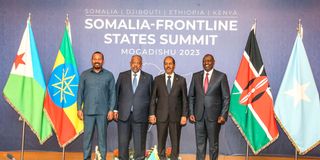
From right: Kenya’s President William Ruto with his counterparts Hassan Sheikh Mohamud of Somalia, Djibouti’s Ismail Omar Guelleh and Abiy Ahmed of Ethiopia in Mogadishu on February 1, 2023, for a regional meeting on efforts to stabilise Somalia and eradicate terrorism.
In January 2024, Kenya is a hobbled regional power on a collision course with almost all its neighbours in EAC and IGAD.
Yet, since President William Ruto took the reins of power 16 months ago, Kenya has invested billions in foreign trips to market the Kenyan brand to the world and cement relations with its neighbours.
Yet, Kenya has been entangled in damaging commercial conflicts with Uganda and Tanzania and diplomatic tiffs with Sudan and Congo. Undiplomatic tweets and statements have turned Kenya’s foreign policy into a Tower of Babel. This has raised serious questions about the effectiveness of President William Ruto’s foreign policy and Kenya as a regional power and peacemaker.
Discernibly, four trends are stoking Kenya’s trouble with its partners in the Horn.
First is the unravelling of Kenya’s ‘dual hegemony’ with Ethiopia, which has weakened the regional architecture for diplomacy and peacemaking weaved around IGAD. Owing to its relative stability, economic, military and diplomatic power, Kenya is a regional power.
Nevertheless, Kenya is not a ‘regional hegemony’ because it does not wield unrivaled power and influence within the Horn region. A December 1964 defence pact between Kenya and Ethiopia enabled the two regional powers to exercise a ‘dual hegemony’ in Eastern Africa. Although the pact has remained in place, since 2018 the two partners have fell to sibling rivalry and geopolitical competition and the ‘dual hegemony’ has gradually disintegrated.
As such, the Horn and Great Lakes region is a perfect multipolar region in which more than two states have similar amounts of power. Like America globally, Kenya is forced to exercise its regional power in a ‘multipolar region’.
Second, a glaring inability by the Ruto Administration to strike a neat balance between Nairobi’s trade interests and the imperatives of maintaining good relations with Kenya’s neighbours has put the country on a collision course with Uganda and Tanzania and partners in EAC.
The proliferation of commercial and diplomatic disputes with its regional partners reflect Kenya’s uncoordinated, enfeebled and overstretched diplomatic capacity.
President Yoweri Museveni has publicly accused Kenyan middlemen of being behind high pump prices in Kampala even as fuel fell globally. In April 2023, his government obtained commitment from Kenya to directly import its fuel starting January 2024.
But on December 28 last year, Uganda was forced to file a case against Kenya at the East African Court of Justice after Nairobi declined to grant the Uganda Oil Corporation permit to operate as a local oil marketer and handle fuel imports through the port of Mombasa.
Similarly, a commercial dispute has escalated diplomatic tensions with Tanzania. On January 15, 2024, Tanzania Civil Aviation Authority banned the operation of Kenya Airways (KQ) flights between Nairobi and Dar es Salaam as a response to the decision by the aeronautical authorities in Kenya to refuse Tanzania’s request for all-cargo flight operations by Air Tanzania. The ban halted passenger flights, with the ripple effects feared to extend to tourism, businesses, regional trade and even diplomatic relations. However, calm has returned after a meeting between Tanzania’s foreign Minister, January Makamba and Prime Cabinet Secretary Musalia Mudavadi.
Third, perceptions of lack of neutrality and sincerity have hobbled Kenya’s role as a regional peacemaker. IGAD appointed Ruto to lead its sub-committee, called the Quartet Group, to mediate an end to Sudanese conflict, but tension between Sudan’s military rulers and Ruto have impeded IGAD mediation effort.
In July 2023, the Sudan Armed Forces (SAF) under Sudan’s de facto ruler General Abdel Fattah al-Burhan rejected Kenya’s involvement in mediation efforts to end the Sudanese conflict accusing Ruto of having business ties with the leader of the rival paramilitary Rapid Support Force (RSF) Mohamed Dagalo (Hemedti) and providing a haven to the RSF.
Kenya has denied the allegations. On July 10, 2023, Sudan flatly rejected a proposal by the Ruto-led Quartet Group to deploy regional peacekeepers to protect civilians and secure humanitarian corridors.
On January 4 this year, Sudan recalled its ambassador from Nairobi, protesting against the official reception of Dagalo — although the RSF chief has also met with the leaders of Uganda, Ethiopia, Djibouti and South Africa. The situation has come to a head after Sudan declined to attend an IGAD mediation in Uganda on January 18.
In the same vein, on December 16, 2023 the Democratic Republic of Congo recalled its ambassador to Kenya. President Felix Tshisekedi accused Nairobi of allowing M23 rebels to operate on Kenyan soil.
Finally, members of the Kenyan parliament and cabinet have goofed in their statements regarding foreign countries. An undiplomatic tweet by Moses Kuria as trade Cabinet Secretary stoked the anger of Sudan by suggesting that the African Union should mobilize a strong army to bomb Khartoum to act as a lesson to other countries experiencing instability.
Another tweet by Senate Speaker Amason Jeffah Kingi in December 2023 angered authorities in Mogadishu by referring to Mohamed Ahmed Mohamoud, the Liaison Officer of Somalia’s breakaway region of Somaliland in Nairobi, as “ambassador to Kenya” and calling for “collaboration and partnerships between our governments.” Kenya’s foreign affairs managers were forced to clarify that: “only the Federal Republic of Somalia is the recognized state entity.”
A media interview on December 18, 2023, irked Rwanda when Transport CS Kipchumba Murkomen described Kigali as an “autocracy”.
Kenya has to cease throwing its economic and political weight around like a colossus and become a gentle giant.
- Professor Peter Kagwanja former Government Adviser (2007-2013), and currently Chief Executive at the Africa Institute (API), Adjunct Professor at the University of Nairobi and visiting scholar at the National Defence University—Kenya (NDU).







